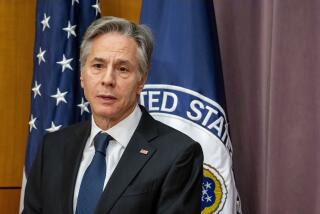U.S. Firms Press for Aid to Brazil
- Share via
Brazilians are not the only ones who want their country bailed out of its current economic mess: Major U.S. companies with stakes in South America’s largest economy have made billions of dollars of loans whose repayment is now jeopardized by interest rates as high as 50%.
Citibank with $3.7 billion in loans, Bank of Boston with $3.4 billion and General Motors with nearly $1 billion are just a few of the U.S. companies with big exposures by virtue of direct investment in Brazilian financial institutions. All are lobbying hard for an assistance package now under discussion that is said to total at least $25 billion.
An aid package would restore confidence and improve the chances that rates would head down again soon, said Jose A. Garcia-Cantera, bank analyst at Salomon Smith Barney who recently analyzed foreign lenders in Latin America.
Even if a bailout materializes, lenders in Brazil are looking at months of tough times and a higher probability of defaults, he said.
The exposure of U.S. and other foreign lenders in Brazil illustrates the peril that the global financial community would face in the event of a Brazilian economic meltdown.
U.S. companies have invested billions of dollars there in recent years, and the country is the 11th-largest destination for U.S. exports, which last year totaled $16.9 billion.
Lenders in Brazil face sharply higher risks since the country raised interest rates to 50% from 19% earlier this month, a measure designed to curb currency speculators and stem capital flight. But the hike also makes it harder for borrowers to make their payments and could send the country into a recession.
U.S. and other foreign lenders have a much higher stake in Brazil, for example, than in Russia. Foreign loans via Brazilian affiliates total $109 billion, or 15% of the nation’s banking system, Salomon Smith Barney said. In Russia, where loan volume is far smaller, foreigners are on the hook for only 4% of the total.
A Brazilian assistance package is now said to be under discussion in Washington by representatives of the Treasury Department, International Monetary Fund, World Bank and Inter-American Development Bank. The Group of 7 industrialized nations as well as major U.S. commercial and investment banks are also said to be willing to contribute.
“I don’t think we are facing the risk of a systemic bank crisis in Brazil,” Garcia-Cantera said. “But we believe there might be a recession in Brazil next year, which could have an impact on asset quality of Brazilian banks, and that will mean lower profitability and in some cases pressure on the capital bases.”
While U.S. lenders might hope for early action, Brazil hopes to hold off until after its Oct. 4 presidential elections to formally ask for aid. That’s because any package will probably come with strings attached, including steep budget cuts and government payroll cuts, that might cost votes.
“The question is whether events might force them to go to the IMF sooner,” said one Washington finance expert involved in the talks.
Skepticism is due to the fact that capital is leaving the country at a rate of nearly $1 billion a day, though the total has slowed in recent days. The nation’s foreign currency reserves have shrunk from $75 billion in early August to $48 billion, according to Citibank in Sao Paulo.
An aid package could in effect be used by Brazil as a supplement to its foreign reserves to draw upon to defend the currency. Sidney Weintraub, senior fellow at the Center for Strategic and International Studies in Washington, said that would send a message to global markets that Brazil had the wherewithal to withstand the ongoing speculative assault.
Investors are mainly alarmed by Brazil’s high debt levels, exacerbated by a growing budgetary deficit that adds to it. And the cost of servicing that has jumped by $5 billion a month since the hike in interest rates.
“Brazil has a lot of short-term debt that has to get refinanced over the next 60 days, and if they have to do it at 40% to 50% rates, that throws the budget into a cocked hat in any event,” Weintraub said.
The challenges facing President Fernando Henrique Cardoso won’t end with reelection, assuming as everyone does that he will emerge victorious Oct. 4.
Assuming Cardoso is reelected and he is able to push budget cuts through Brazil’s fractious Congress, those cuts would take 18 months to filter down as real spending cuts because of the high initial cost in severance payments in making government layoffs, said Paulo Levy, director of the Institute for Applied Economic Research in Rio de Janeiro.
* BRAZILIANS BRACE: Austerity plan likely to hurt working class. A5
(BEGIN TEXT OF INFOBOX / INFOGRAPHIC)
Moving Money
Spooked by the emerging-market crisis and the threat that Brazil’s real will be devalued, foreign capital is heading for the exits. The outflow has slowed sharply this week, but Brazil’s foreign currency reserves hae dropped to about $46 billion from $75 billion in early August. Daily outflow since Sept. 1, in billions:
Sept. 18 (Friday *): $463 million
* Preliminary
Sources: Citbank in San Paulo, Brazil; J. . Morgan
More to Read
Inside the business of entertainment
The Wide Shot brings you news, analysis and insights on everything from streaming wars to production — and what it all means for the future.
You may occasionally receive promotional content from the Los Angeles Times.










